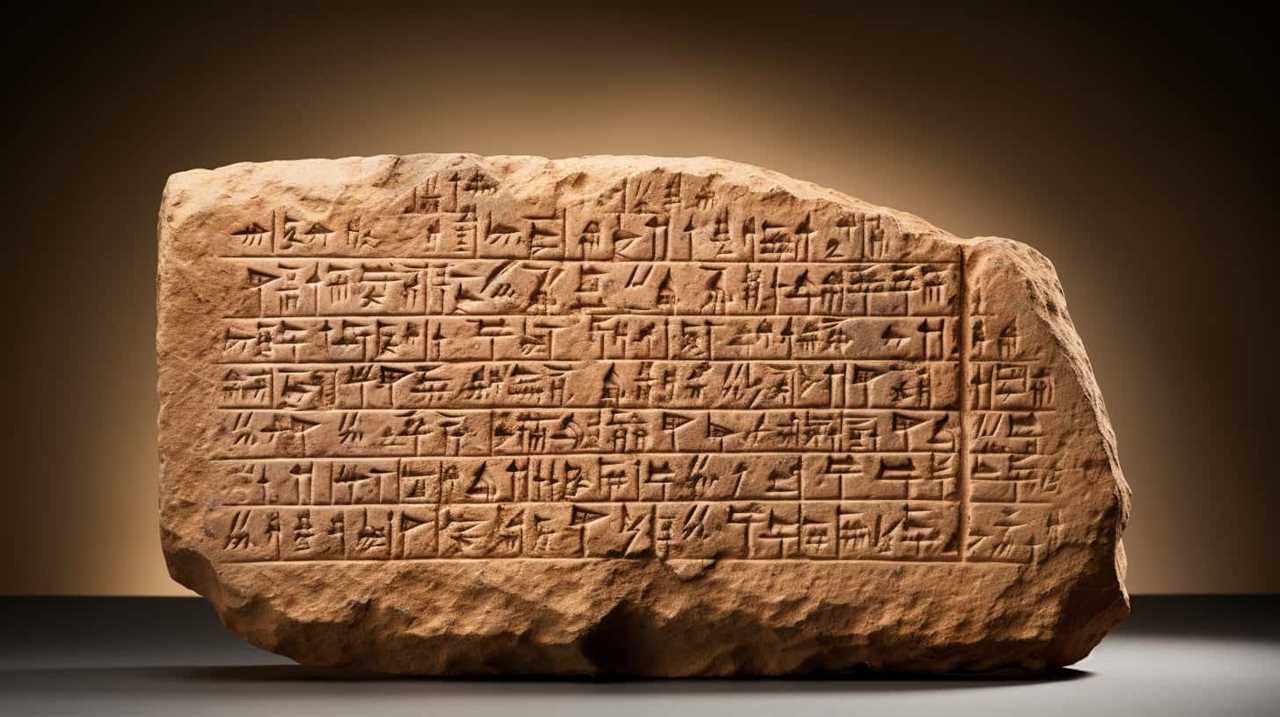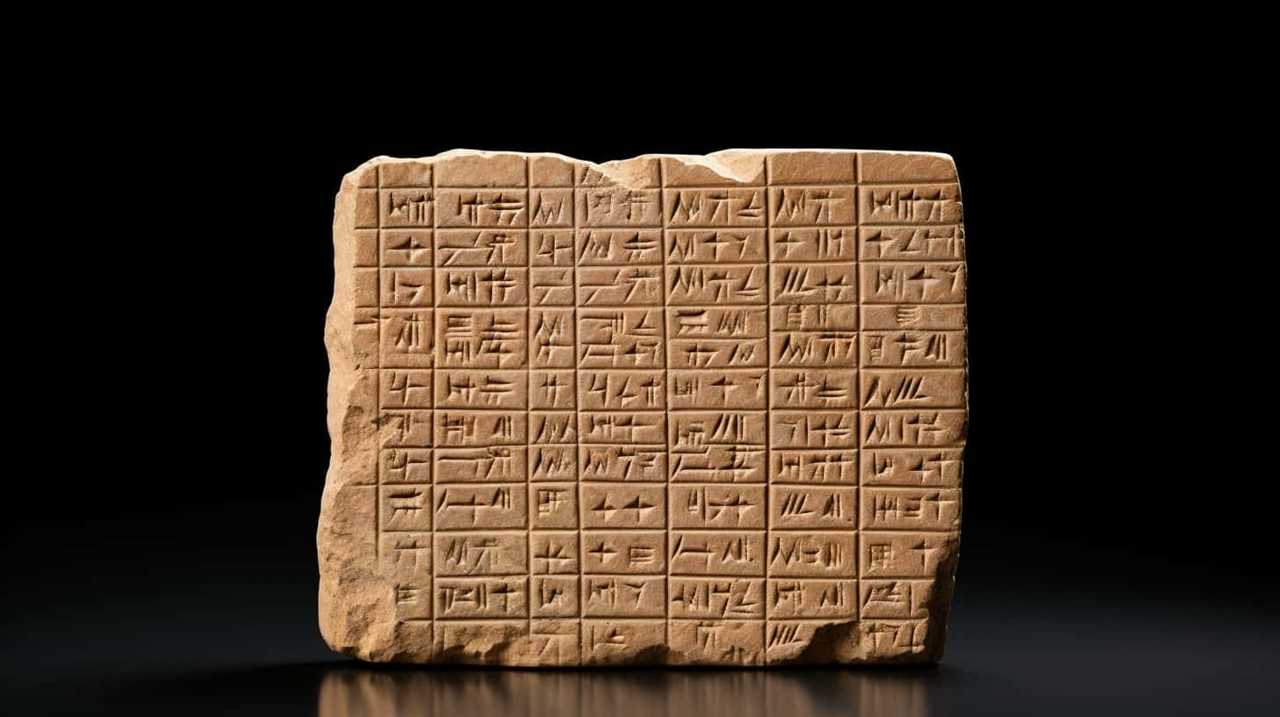In our quest for greatness, we often turn to the teachings of historical figures for guidance. Ancient Greece, known for its rich philosophical legacy, offers us a treasure trove of timeless wisdom.
In this collection, we present to you eight Greek quotes that have the power to illuminate your path. From Socrates, we learn the importance of self-reflection and the pursuit of wisdom. Aristotle teaches us to find virtue in every aspect of life. Plato reminds us of the boundless power of imagination. Epictetus guides us towards embracing stoic principles.
Heraclitus imparts the wisdom of embracing change and flux. Pythagoras reveals the harmony of numbers and existence. Diogenes encourages us to live a simple and honest life. And Sophocles delves into the complexity of human nature.
Let these quotes be your guiding light on the journey to mastery.

Key Takeaways
- Self-reflection and introspection are powerful tools for personal growth and self-discovery.
- Virtue is developed through consistent practice and leads to flourishing.
- Imagination has the ability to transform perception and foster empathy.
- Embracing change is essential for personal and societal progress.
Socrates: The Wisdom of Self-Reflection
Socrates exemplifies the power of self-reflection in cultivating wisdom. His teachings emphasize the art of self-examination, introspection, and self-awareness. Socrates believed that true knowledge could only be attained through questioning and critical thinking. He encouraged his students to challenge their beliefs and explore different perspectives, recognizing that this process of inquiry leads to self-discovery and personal growth.
Socrates understood the importance of questioning one’s own assumptions and beliefs. By engaging in rigorous self-reflection, individuals can uncover hidden biases and limitations, allowing for a deeper understanding of themselves and the world around them. This process of introspection enables individuals to become more aware of their own strengths and weaknesses, ultimately leading to personal growth and the cultivation of wisdom.
Through Socratic dialogue, Socrates encouraged his students to examine their own thoughts and beliefs, fostering a deeper understanding of themselves and their values. By constantly questioning and challenging one’s own ideas, individuals can refine their thinking and develop a more nuanced perspective.
Socrates’ teachings on self-awareness and self-examination have stood the test of time and continue to be relevant in our modern world. By embracing the art of self-reflection, we can embark on a journey of personal growth and wisdom, paving the way for a more fulfilling and meaningful life.

With this understanding of Socrates’ teachings on self-reflection, we can now transition into the subsequent section about Aristotle and his exploration of finding virtue in life.
Aristotle: Finding Virtue in Life
Reflecting on Aristotle’s teachings, we strive to uncover the essence of finding virtue in life. Aristotle believed that virtue ethics and moral character were essential for leading a fulfilling and meaningful life. Here are four key insights from Aristotle’s philosophy that can guide us in our pursuit of virtue:
- The Golden Mean: Aristotle emphasized the importance of finding the balance between extremes. Virtue lies in the middle ground between excess and deficiency. For example, courage is the mean between recklessness and cowardice.
- Habituation: Aristotle believed that virtue isn’t innate, but rather developed through consistent practice. By repeatedly acting virtuously, we cultivate good moral character and become virtuous individuals.
- Eudaimonia: Aristotle defined eudaimonia as the ultimate goal of human life – a state of flourishing and well-being achieved through the cultivation of virtue. True happiness is found in living a virtuous life.
- Community and Friendship: According to Aristotle, virtuous actions aren’t only for personal gain but also for the betterment of the community. Meaningful connections and friendships are essential in developing virtuous character.
By embracing these principles, we can strive to lead a life of virtue and moral excellence.
Transitioning into the subsequent section about Plato, we explore the power of imagination and its role in shaping our reality.

Plato: The Power of Imagination
Plato’s profound understanding of the power of imagination continues to inspire and captivate us today. Imagination has the ability to transform our perception of the world, allowing us to see beyond what’s immediately visible.
Through his philosophical insights, Plato reminds us of the immense potential that lies within our minds and encourages us to embrace the creative power of imagination to shape our reality.
Imagination’s Transformative Influence
Imagination holds immense transformative power, shaping our perceptions and guiding our actions towards new possibilities. It’s through imagination that we’re able to unlock hidden potential and tap into the depths of our creativity.
Here are four ways in which imagination influences and impacts our lives:

- Expanding Horizons: Imagination allows us to envision a world beyond what’s currently known, pushing boundaries and challenging societal norms.
- Problem Solving: By thinking outside the box and using our imagination, we can come up with innovative solutions to complex problems.
- Empathy and Understanding: Imagination helps us to put ourselves in others’ shoes, fostering empathy and promoting understanding among diverse perspectives.
- Inspiration and Motivation: Imagination fuels our passion and motivation, driving us to pursue our dreams and achieve greatness.
Plato’s Philosophical Insights
Building on the previous subtopic’s exploration of imagination’s transformative influence, we can now delve into Plato’s philosophical insights on the power of envisioning new possibilities.
Plato, a renowned Greek philosopher, believed that the human mind has the capacity to transcend the limitations of the physical world through the power of imagination. In his famous Allegory of the Cave, Plato described how individuals are trapped in a dark cave, perceiving only shadows of reality. Through the pursuit of knowledge, he argued, we can free ourselves from this cave and attain a deeper understanding of the world.
Plato’s theory of forms further emphasized the search for ultimate reality. According to him, the material world is merely a reflection of an ideal realm of forms, and true knowledge can only be achieved by contemplating these eternal and unchanging concepts.
Epictetus: Embracing Stoic Principles
When it comes to embracing stoic principles, there are valuable life lessons we can learn from Epictetus. His enduring wisdom offers guidance on how to navigate the challenges of life with inner resilience.

Stoic Life Lessons
As we delve into the realm of Stoic Life Lessons, we explore the profound teachings of Epictetus and how they inspire us to embrace Stoic principles. Epictetus, a prominent Stoic philosopher, believed in the importance of self-discipline and the practice of Stoic philosophy to achieve inner peace and happiness.
Here are four key lessons we can learn from Epictetus:
- Accept what you can’t control: Epictetus teaches us to focus on what’s within our control and accept external events beyond our influence.
- Cultivate a mindset of resilience: Epictetus encourages us to develop mental fortitude and not be disturbed by external circumstances.
- Embrace the power of choice: Epictetus reminds us that we’ve the power to choose our thoughts, emotions, and actions, regardless of external circumstances.
- Live in accordance with nature: Epictetus emphasizes the importance of aligning ourselves with the natural order of the universe and accepting the inevitability of change.
Epictetus’s Enduring Wisdom
Epictetus’s enduring wisdom illuminates the path of those who embrace Stoic principles. His teachings offer enduring stoic principles that guide individuals towards inner resilience. Stoicism, a philosophy rooted in ancient Greece, emphasizes the importance of maintaining a calm and rational mindset in the face of adversity.
Epictetus’s wisdom encourages individuals to focus on what they can control, rather than being consumed by external circumstances. By cultivating inner resilience, one can navigate life’s challenges with equanimity and wisdom.

Epictetus teaches that true freedom lies in the power to choose our response to any given situation. By embracing Stoic principles, individuals can cultivate a steadfast mindset that enables them to face life’s ups and downs with grace and strength.
Embracing Inner Resilience
Continuing from Epictetus’s enduring wisdom, we can embrace inner resilience by adopting Stoic principles. Stoicism teaches us to cultivate resilience and self-reflection, enabling us to navigate life’s challenges with strength and grace.
Here are four key principles to embrace:
- Embrace change: Stoicism encourages us to accept and embrace the inevitability of change. By understanding that everything is impermanent, we can adapt and find strength in the face of uncertainty.
- Practice self-reflection: Stoicism emphasizes the importance of self-awareness and reflection. By regularly examining our thoughts and actions, we can gain insight into ourselves and develop resilience in the face of adversity.
- Cultivate simplicity: Stoicism teaches us to focus on what truly matters and let go of unnecessary desires and attachments. By embracing simplicity, we can find inner peace and resilience in a chaotic world.
- Accept what we can’t control: Stoicism teaches us to accept the things we can’t control and focus on what’s within our power. By letting go of external outcomes, we can cultivate resilience and find contentment in any situation.
Heraclitus: Embracing Change and Flux
We, as seekers of wisdom, understand the importance of embracing change and flux according to Heraclitus. The ancient Greek philosopher Heraclitus believed that change is inevitable and that everything is constantly in a state of flux. He famously said, ‘No man ever steps in the same river twice, for it’s not the same river and he’s not the same man.’

Heraclitus recognized that the world is constantly changing, and that we must adapt and embrace this change in order to grow and evolve.
Heraclitus’s philosophical insights on embracing change are particularly relevant in today’s fast-paced and ever-changing world. In order to thrive and succeed, we must be willing to let go of old ways of thinking and be open to new ideas and perspectives. Instead of resisting change, we should embrace it as an opportunity for growth and self-improvement.
By embracing change, we can learn to navigate uncertainty and embrace new experiences with an open mind and a positive attitude.
Heraclitus’s teachings remind us that change isn’t something to be feared, but rather something to be embraced. By embracing change and flux, we can become more adaptable, resilient, and open-minded individuals.

Pythagoras: The Harmony of Numbers and Existence
As seekers of wisdom, let’s delve into the realm of Pythagoras and explore the harmonious relationship between numbers and existence.
Pythagoras, the renowned Greek philosopher and mathematician, believed that there’s a profound harmony in mathematics that mirrors the harmony found in the universe itself. Here are four key insights that shed light on Pythagoras’ teachings:
- The Pythagorean theorem: This fundamental theorem states that in a right-angled triangle, the square of the hypotenuse is equal to the sum of the squares of the other two sides. It exemplifies the interplay between numbers and geometric shapes, revealing the mathematical harmony underlying the physical world.
- Numerical symbolism: Pythagoras assigned symbolic meanings to numbers, seeing them as expressions of cosmic principles. For example, the number one represented unity and the source of all existence, while the number four symbolized stability and perfection.
- Music of the spheres: Pythagoras believed that the movement of celestial bodies could be understood through the harmony of numbers. He saw the cosmos as a grand symphony, with each planet and star producing a unique sound that contributes to the overall cosmic harmony.
- The golden ratio: Pythagoras recognized the beauty and balance in the golden ratio, a mathematical proportion found in natural phenomena and art. This ratio, approximately 1.618, is believed to be aesthetically pleasing and can be found in the proportions of the human body, architecture, and artwork.
By delving into the harmony in mathematics and the profound insights of Pythagoras, we can deepen our understanding of the interconnectedness of numbers and existence.
Now, let’s transition to the next section and explore the teachings of Diogenes, who advocated for living a simple and honest life.

Diogenes: Living a Simple and Honest Life
Let’s explore how Diogenes advocated for living a simple and honest life through his radical philosophy.
Diogenes, a Greek philosopher and one of the founders of Cynicism, believed in the power of simple living and honesty in life. He rejected societal norms and material possessions, choosing instead to live a life of minimalism and self-sufficiency.
Diogenes believed that by embracing simplicity and rejecting unnecessary desires, one could find true freedom and contentment. He famously lived in a barrel and had no need for wealth or luxury.
Diogenes believed that honesty was essential for living a meaningful life. He encouraged people to be true to themselves and to live authentically, without pretense or deceit. Diogenes believed that by living a life of honesty and simplicity, one could find inner peace and live in harmony with nature.

His radical ideas challenged the conventional notions of success and happiness, urging individuals to prioritize a life of integrity and truth.
As we delve into the philosophy of Diogenes, we’ll discover how Sophocles explored the complexity of human nature in his works.
Sophocles: The Complexity of Human Nature
Sophocles illuminates the intricacies of human nature through his profound exploration in his works. His plays delve into the complexity of human emotions and the tragedy of fate, offering timeless insights into the human condition.
Here are four key aspects that Sophocles highlights:

- Conflicting Motivations: Sophocles portrays characters who are torn between different desires and obligations. This reflects the internal struggle that individuals often face, showcasing the multifaceted nature of human emotions.
- Moral Ambiguity: The playwright challenges traditional notions of right and wrong by presenting morally ambiguous characters. This forces the audience to question their own beliefs and judgments, emphasizing the intricate moral dilemmas that humans encounter.
- Hubris and Tragic Flaws: Sophocles explores the detrimental consequences of excessive pride and tragic flaws. Through his characters, he illustrates how these flaws can lead to downfall and suffering, serving as cautionary tales for the audience.
- The Power of Fate: Sophocles emphasizes the tragic inevitability of fate in his works. He explores the idea that humans are often at the mercy of forces beyond their control, underscoring the complexity of the human experience.
Through his nuanced portrayal of human nature, Sophocles challenges our understanding and invites us to contemplate the intricacies of our own emotions and the tragic nature of our existence.
Frequently Asked Questions
What Are Some Practical Steps One Can Take to Incorporate Self-Reflection Into Their Daily Life, Based on Socrates’ Teachings?
We can incorporate self-reflection into our daily life by cultivating curiosity and practicing the Socratic method. By asking thoughtful questions and examining our beliefs, we can gain deeper insights and wisdom.
How Can Aristotle’s Concept of Virtue Be Applied to Modern-Day Life?
Applying virtue ethics in modern society involves balancing virtues in daily life. Aristotle’s concept of virtue remains relevant today, guiding us to cultivate moral excellence and find harmony in our actions and character.
Are There Any Specific Exercises or Practices Recommended by Plato to Enhance One’s Imagination?
Practices and exercises recommended by Plato to enhance one’s imagination include engaging in philosophical dialogues and questioning assumptions, as well as exploring different perspectives and contemplating abstract concepts.

What Are Some Practical Ways to Apply Epictetus’ Stoic Principles in Everyday Situations?
Incorporating Epictetus’ stoic principles in everyday situations can greatly benefit our relationships and decision-making. By applying self-reflection and remaining mindful of our reactions, we can cultivate inner peace and resilience.
How Can Pythagoras’ Belief in the Harmony of Numbers Be Connected to Finding Meaning and Purpose in Existence?
Finding meaning and purpose in existence can be connected to Pythagoras’ harmony of numbers. By exploring the role of self-reflection in Socrates’ teachings, we can understand how the order and balance of numbers can guide us towards a more fulfilling life.
Are These Ancient Greek Quotes Still Relevant for Modern Life?
Yes, ancient greek quotes for life are still relevant today. “Know thyself” is a reminder to practice self-awareness, while “Happiness depends upon ourselves” encourages taking responsibility for one’s own well-being. “Change is the only constant” remains a timeless message about embracing life’s inevitable transformations.
How Do Classic Literature’s Inspirational Quotes Compare to Timeless Greek Quotes?
Timeless Greek quotes have stood the test of time, much like classic literature inspirational quotes. Both share deep wisdom and timeless insights that continue to resonate with readers today. While their origins may differ, the universal truths they convey remain relevant across cultures and generations.
Conclusion
In the vast sea of wisdom, these timeless Greek quotes serve as guiding stars, illuminating our path with their profound insights.
Like a symphony of thoughts, they stir our souls and awaken our minds.

From Socrates’ call to self-reflection to Heraclitus’ embrace of change, each quote offers a unique perspective on life’s complexities.
Let’s embrace these ancient teachings, like a compass leading us through the ever-changing tides of existence.









